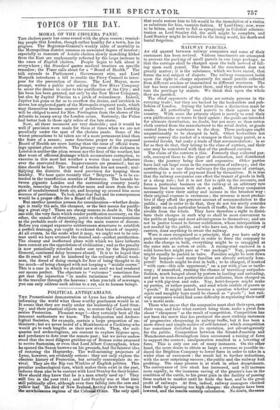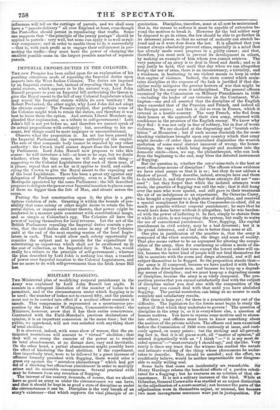RAILWAY PARCELS.
Air old quarrel between railway companies and some of their customers has been revived. Various enactments are attempted to prevent the packing of small parcels in one large package, so that the carriage shall be charged upon the bulk instead of fall- ing upon each parcel. The form of the enactment does not greatly matter ; it is the substance, which we have stated, that forms the real subject of dispute. The railway companies insist upon the right to charge separately for small parcels collected from different senders or transmitted to different receivers. The law has been construed against them, and they endeavour to ob- tain the privilege by statute. We think that upon the whole justified.
The are The chief opponents of the claim are certain persons in the
carryinc, trade ; but they are backed by the booksellers and pub- lishers of London. Among the latter class a distinction must be made. All periodically send parcels to their agents in the country. With some the primary object is merely to send their own publications or wares to their agents : the goods are intended for ultimate distribution, no doubt, but not more so than cotton cloth carried from the manufacturer to the retail dealer, or goods carried from the warehouse to the shop. These packages ought unquestionably to be charged in bulk. Other booksellers not merely convey the packet of a stranger in their large parcel, as a personal favour, but make a trade of that accommodation : in so far as they do that, they belong to the class of carriers, and their case may be considered with that of the professed carriers. The claim of the carriers is this. Formerly they collected par- cels, conveyed them to the place of destination, and distributed them; the journey being slow and expensive. Other parties have laid out large sums in the construction of railways ; and the carriers claim to use those railways for the purpose of carriage, according to a mode of payment fixed by themselves. It is true that the railway companies can effect the transit of goods in hulk at a cheap rate ; but it is not fair to split up the accounts, and force a particular business on the railway at an arbitrary rate because that business will show a profit. Railway companies necessarily view their outlay and income in the broadest way : their original expense is enormous ; the revenue is most produc- tive if they afford the greatest amount of accommodation td the public • and in order to do that, they do not too nicely consider the profit on each particular branch of traffic, but the income de- rivable from the whole. They have therefore a right to distri- bute their charges in such way as shall be most convenient to the public at large and most advantageous to themselves ; and are not in justice bound to favour middlemen, whose interposition is not needed by the public, and who have not, in their capacity of carriers, done anything to create the railway. Were it once recognized as a principle, that you have only to pack separate articles together in order to force the company to make the charge in bulk, everything might be so smuggled at the same rate as cotton or coals. -A racing-stud enclosed in a solid horse-box might pass as "one package." Nay, passengers might equally be packed in bales. Families might be sent down by the hamper—and many families are already seriougly ham- pered! Schools might be sent in bulk ; to be charged, if marked with care—this side uppermost," on a par with glass or turtle- soup; if unmarked, running the chance of travelling antipodes- fashion, much banged about by porters in loading and unloading, and put in trains not particular about collisions, then charged on a par with pig-iron and coke. Nay, hotel-keepers might make up parties, or rather parcels, and send whole innfuls of guests as "goods." It might indeed become a question whether mimesis sujets and naughty boys could be classed as " goods "; but rail- way companies would find some difficulty in regulating their tariff on a moral scale.
Those who argue that the companies must shut their eyes, open their vans and take what carriers bring them, make a great fuss about " cheapness " as the result of competition. Competition has not been the screw that has produced the most striking instances of progressive cheapening in railway traffic, but it has been a more direct and simple motive of self-interest ; which competition has sometimes disturbed in its operation, not advantageously for the public. Competition between the Grand-Junction and Manchester-and-Birmingham lines occasioned a raising of fares to support the contest; amalgamation resulted in a- lowering of fares. This is only one out of many instances. On the other hand, the mere desire to obtain as large a revenue as possible in- duced the Brighton Company to lower fares in order to take in a wider class of customers : the result led to further reductions, with the most surprising success ; the public and the railway both profiting. The same process is at work in other departments. The conveyance of live stock has increased, and will increase more rapidly, to the immense saving of the grazier's loss in the condition of the cattle, to his great gain in the facility of passing from market to market until he finds the best; and to the great profit of railways. At first, indeed, railway managers checked that traffic by imposing too high charges: the charges have been lowered, and the results outstrip calculation. No doubt, the was
influences will tell on the carriage of parcels, and we shall soon have a " parcels-delivery " all over England at least, even though the Post-office should persist in repudiating that traffic. Some One suggests that "the principle of the penny postage" should be applied to parcels : very well, but none can apply it so well as rail- way companies; and in order to enable them to do it successfully —that is, with such profit as to engage their self-interest in pro- moting the traffic—they must have the power of charging the =sliest possible sums on the largest possible number of separate parcels.



























 Previous page
Previous page